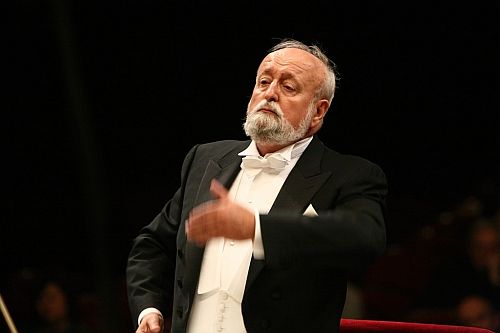 United Kingdom Penderecki, Lutosławski: Royal Northern College of Music Symphony Orchestra, Chorus and Chamber Choir,- Bridgewater Hall, Manchester, Friday 26th June 2015 (MC)
United Kingdom Penderecki, Lutosławski: Royal Northern College of Music Symphony Orchestra, Chorus and Chamber Choir,- Bridgewater Hall, Manchester, Friday 26th June 2015 (MC)

Penderecki: Entrata
Lutosławski: Concerto for Piano and Orchestra
Penderecki: Symphony No 7 ‘Seven Gates of Jerusalem’ (UK première)
Krzysztof Penderecki (conductor: Symphony No. 7),
Piero Lombardi (conductor: Entrada),
Maciej Tworek (conductor: Concerto for Piano and Orchestra),
Dominic Degavino (piano)
Hannah Dahlenburg (soprano)
Emma-Claire Crook (soprano)
Hollie-Anne Bangham (mezzo-soprano)
Christopher Littlewood (tenor)
Aidan Edwards (bass)
Arthur Bruce (speaker)
This was one truly remarkable concert of two Polish composers the like of which I doubt will be seen again at Bridgewater Hall. To have Krzysztof Penderecki conducting one of his own masterworks was something special, particularly with a work as monumental in proportions as the Symphony No. 7, and to see such a large audience for a programme of contemporary music exceeded my expectations.
The concert got off to a blazing start with Piero Lombardi directing Penderecki’s Entrata for eleven brass instruments accompanied by timpani. This stirring fanfare was given a compelling rendition of real authority by the brass with markedly fine intonation. Witold Lutoslawski’s music can be tough going for many listeners but like many new works the anticipation can be much worse than the actual experience, the Concerto for Piano and Orchestra being a case in point. This splendidly engaging work composed in 1988 is a blend of romantic and modern textures in a generally conventional framework. Lutoslawski was a composer noted for writing with painstaking precision; nevertheless in the ‘ad libitum’ sections soloist Dominic Degavino had some freedom to journey independently from the conductor. With a strong sense of involvement Degavino captured much of the elusive character of the writing that radiated a stark beauty. In this convincingly incisive account of the score the RNCM orchestra was a sympathetic partner with conductor Maciej Tworek bringing out plenty of luscious detail.
I never thought I would have the opportunity of hearing and seeing a performance of the featured work of the evening, Krzysztof Penderecki’s Symphony No 7 symbolically entitled ‘Seven Gates of Jerusalem’. In 1974 following the ‘Yom Kippur’ War the composer had visited Jerusalem and passed through the gates in the city walls, seven of which are accessible with another exclusively for the Messiah. A 1997 commission for the third millennium celebration of the city of Jerusalem the score was receiving its UK première at Bridgewater Hall under Penderecki’s own baton. Lavishly scored, the work requires five soloists (SSATB), a speaker, a large orchestra and a 150 strong choir. In addition, a twenty strong cohort of wind and brass was positioned at the rear of the hall in the gallery. In one of the movements a solo trumpeter stood on the choir stairs above the side of the stage.
This remarkable choral symphony uses a sequence of Old Testament texts announcing the coming of the Messiah. Six of the movements are in Latin with one movement (No. 6) being a spoken setting originally in Hebrew from the Book of Ezekiel that the composer insisted be read in the language of the audience. Amongst Penderecki’s battery of percussion instruments was one of his own design: a tubaphone, open plastic pipes of differing lengths stacked and secured in a metal frame. There were two tubaphones, one at each side of the stage, operated by striking the rear base with a pair of paddles; very similar to a tennis table bats. Given the bulk and length of the tubaphones the hollow sound they made was rather disappointing.
Containing as it did all the drama of a Puccini opera in a sacred setting I understood the symphony as a powerful message to all mankind for world peace. Conductor Penderecki held his massive forces together effectively and only rarely during the considerable length did the forward momentum show signs of flagging. Clearly impeccably rehearsed the RNCM Symphony Orchestra displayed excellent unity and intonation throughout this demanding work. So noticeable was the excellence of performance it was difficult to believe that one wasn’t hearing a professional orchestra. It was hard to fault the combined choirs, committed and full toned together with an effective quintet of soloists showing great promise in a hall acoustic that is extremely challenging for far more experienced solo singers.
In movement six ‘The Hand of the Lord was Upon Me’ the solo trumpeter above the side of the stage made a significant impression. Striking was the clear diction of Arthur Bruce narrating Ezekiel’s prophecy assuredly in English who towards the end fought a losing battle against the sonorous orchestral climax. In particular the Finale, a series of various inspirational texts, beginning with ‘Haec dicit Dominus’ (Thus says the Lord) from Jeremiah was unforgettable for the wonderful orchestral weight especially the shadowy-toned brass and percussion. In the electrifying ending ‘Ipse reget nos in saecula’ (He shall rule over us forever) from Psalm 47.13 all the forces united for a colossal climax of seven fortissimo chords providing a degree of sacred awe rarely experienced.
The standard of performance of these twentieth-century works bowled me over especially Penderecki’s colossal Seventh Symphony just overflowing with sacred drama, special effects and visceral power. It was an awe inspiring evening at the Bridgewater Hall that will stay long in the memory.
Those that stayed behind after the concert saw a Fellowship of the RNCM Krzysztof Penderecki conferred on Krzysztof Penderecki.
Michael Cookson